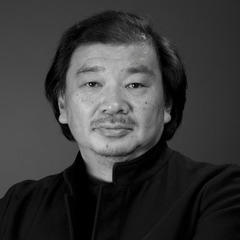Shigeru Ban
Shigeru Ban (Japanese坂 茂Shigeru Ban, born in 1957 in Tokyo Prefecture, Japan ) is a contemporary Japanese architect.
Biography
Ban studied in the 1980s at the Southern California Institute of Architecture in Los Angeles and moved to the Cooper Union 's School of Architecture in New York City, where John Hejduk was his teacher, and graduated in 1984 from.
In his work, Ban combines traditional Japanese design with modern architecture. He is known especially for his designs with cardboard tubes. The made of cardboard Japanese Pavilion at the Expo 2000 in Hannover was built by Ban, in collaboration with Frei Otto and should show what 's possible with a cardboard construction.
In 1995, Ban the Voluntary Architects' Network, a non-governmental organization with the aim of organizing disaster relief in the field of construction. This initiative resulted in paper-based houses, bridges, schools, concert halls and museums.
On 9 December 2009 Ban was awarded an honorary doctorate from the Technical University of Munich.
2014 Ban was awarded the Pritzker Prize. Be assessed, in particular Bans creative use of unconventional materials such as paper, as in the development and construction of temporary shelters for crisis areas.
More famous works
- Furniture store (a series of prefabricated houses ) in Japan, China, and the USA
- The Naked House ( 2000), Kawagoe, Saitama Prefecture, Japan
- Nomadic Museum (2005-2010)
- Takatori Catholic Church in Nagata -ku, Kobe, Hyōgo Prefecture, Japan.
- Centre Pompidou- Metz (2010 ), common design with Jean de Gastines
- Extension publishing house Tamedia, Zurich
- Summer Pavilion Museum Rietberg, Zurich










